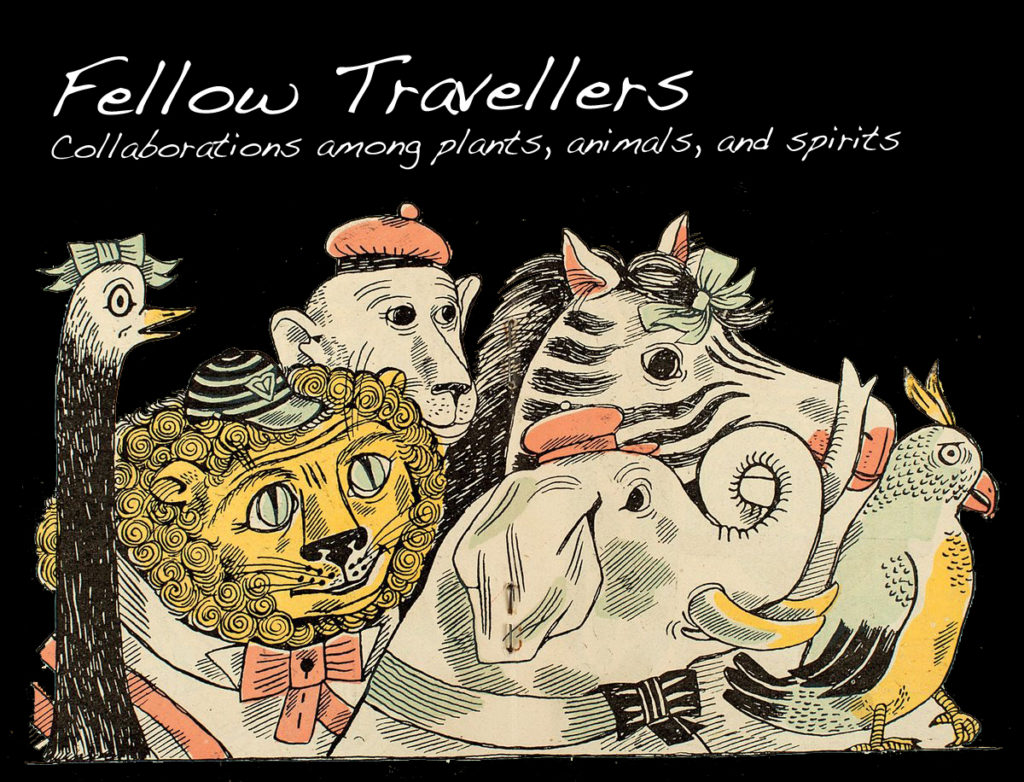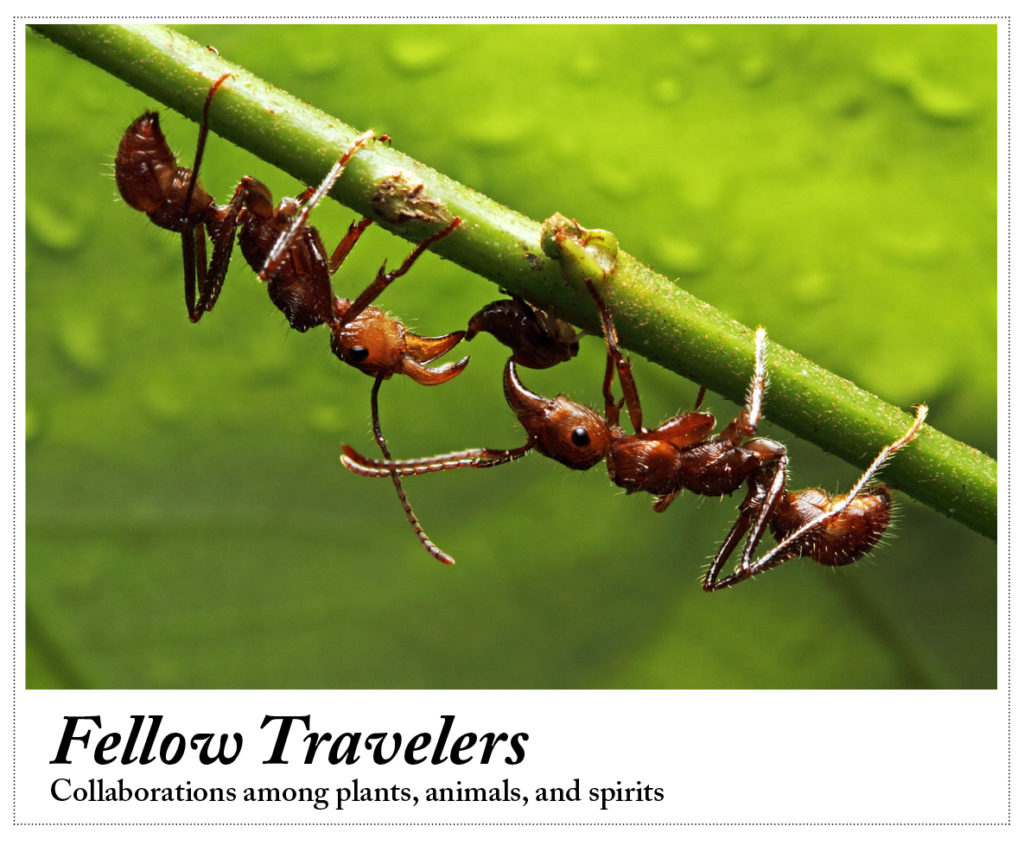 Please join us a for a break-away workshop at the Fallen Tree Center on the edge of the Cornell campus. This workshop is organized under the auspices of the meetings of the Society for Cultural Anthropology. It is free and open to all. Tea and light refreshments will be served.
Please join us a for a break-away workshop at the Fallen Tree Center on the edge of the Cornell campus. This workshop is organized under the auspices of the meetings of the Society for Cultural Anthropology. It is free and open to all. Tea and light refreshments will be served.
Charis Boke | Craig Campbell | Eben Kirksey | Jane Marie Law
Friday, May 13, 2016
Fallen Tree Center 128 Muriel st. Ithaca, NY
1:30-3:00pm
We have booked a van to shuttle people between the SCA conference and the Fallen Tree Center.
Seats on the free shuttle are limited, so RSVP on Eventbrite: http://tinyurl.com/fellow-travellers
This event is made possible with the generous support of
the Atkinson Center for a Sustainable Future at Cornell University.
Abstract.
The need for both individual and collective action in the contemporary world has been met with increasingly urgent calls for novel modes of description, critique, and action. This panel takes up the challenge by looking more carefully beyond the exceptionalism of human forms to a rich world of more-than-human social relations. In the fanciful Lapine language developed by Richard Adams for his novel Watership Down, he designates the word ‘tharn’ to describe the horrifying paralysis of imminent doom faced by rabbits caught in the debilitating light of on-coming traffic. It is tempting to figure an analogy with contemporary modes of sociality, where humans are frozen tharn in the knowledge climate catastrophe poses an increasingly plausible and generalized threat. Such an analogical manoeuver might challenge us not only to imagine new modes of being in the world but to better describe and understand the convivialities of being within a shared biosphere. This move is founded on a practice of learning from and listening to voices across ontological rifts. It is also a move also that leads us from conviviality (living together) to collaboration (working together). Taking the notion of more-than-human collaboration seriously we explore how herbalists listen to plants and what the dead have to say about the future. We examine the gift-giving practices of ants and how our planet is not a limit point or threshold of collective labor. Fellow travelers we argue exist not only among our species and in our time, shaking tacit assumptions about contemporaneousness and autonomy. We examine also the place and location of strange collaborations from bioresearch laboratories to herb gardens, from suburban experiments in goat husbandry to nomadic architecture.
For this session we invite you to join us at the newly established Fallen Tree Center (designed for the re-imagination of suburban life). This session promises an exploration of metaphorical, analogical, and actual possibilities for thinking outside human exceptionalism towards a more-than-human sociality. With our collaborations at Fallen Tree, we recognize in the world a complexity of relations that rarely adhere to conventional notions of collective labour. Fallen Tree is less than two miles from Cornell University in the edgelands of Ithaca near the famous Cornell Ornithological Research Center. A shuttle will bring people to and from the site of the conference. Food and drink will be provided at this session which includes not only a roundtable but also a tour of Fallen Tree.

Summaries of individual presentations:
Charis Boke. Life with plants
Humans and other animals turn to plants for sustenance, for healing, for pleasure, for worship. My work with herbalists in the northeast of the United States, and as an herbalist myself, informs this exploration of what life with plants can mean on an intimate scale. Following the insights of practices developed and sustained by healers, I lead us in an experiential exercise to help us attend to the ways that our own bodies can help us understand our relationships with plants. What can plant materials shift in us? How might we understand interspecies communication, or at the very least the coordination (to use Annemarie Mol’s term) of human bodies and plant bodies through direct experience of plants used for healing work? Through the sharing of (legal) plant-based remedies, I hope to open a door of perception for participants into working intentionally with a world of plants who are already our collaborators.
Craig Campbell. Labouring under the sign of sentience
My contribution to the Fellow Travellers session develops the idea of a ‘sentient ecology’ through a series of major events in central Siberia including a mysterious space body, the Communist Revolution, nuclear waste disposal, and a proposed hydroelectric dam. Writing after his fieldwork with Dolgan reindeer herders, the anthropologist David G. Anderson described the reindeer pastoralists’ sentient ecology – an ontology that sets humans within complex non-human worlds of care and reciprocity. Sentient ecology emerges as a concept through the traditions of circumpolar ethnographies that have tended carefully to the rich ontologies of non-european indigenous peoples of the subarctic and arctic. Key texts like Brightman’s Grateful Prey, Ridington’s Trail to Heaven, and Fienup-Riordan’s Boundaries and Passages have helped to shape anthropological thinking about the limits of the human. While it has not gained popularity, I believe that ‘sentient ecology’ is a timely idiom for disrupting conventional notions of human exceptionalism. Sentient ecology, I argue might be understood as a kind of collective labour for living. Beginning with a case for the world as a more-than-human conviviality—as a sentient ecology defined by relations and reciprocities (Bateson)—I move to set of ideas around more-than-human collaborations. My focus on labour is inspired by MacKenzie Wark’s reading of early Soviet theorists and writers Alexander Bogdanov and Andrei Platonov.
Eben Kirksey. Trophallaxis (Nourishment-Interchange)
Ectatomma ants forage for insects at night under electric lights in the City of Knowledge, an abandoned U.S. military installation in Panama. They also glean sugary liquid honeydew from leafhoppers and communicate with caterpillars in high-pitched stridulatory sounds in old growth forest. Studying trophallaxis—the fluid exchange of material and semiotic elements, in a laboratory at the Smithsonian Tropical Research Institute I found that Ectatomma ants freely give gifts to strangers. Bataille classically argued that the living organism “ordinarily receives more energy than is necessary for maintaining its life…the excess cannot be completely absorbed in its growth, it must necessarily be lost without profit; it must be spent, willingly or not, gloriously or catastrophically.” Collaborating with William Wcislo, Deputy Director of the Smithsonian in Panama, I designed a scientific study to test Bataille’s insights in the world of Ectatomma. Rather than finding a pattern of reciprocal altruism—gifts that demand gifts in return—we found that these ants have fleeting whims, sentiments about the distribution of surplus that are beyond rational calculus. Tracing actions oriented to the care of beings and things, across species lines, I also studied how Ectatomma ants enlist others in the production of common worlds. Working as a participant and observer in the domain of the biological sciences, I explored the speculative possibilities of multispecies ethnography—not just documenting what life is or was like in particular times and places, but also exploring what life might or could be (Ingold 2014; cf. Kirksey 2015).
Jane-Marie Law. Scheming with the Living, Colluding with the Dead: The Conversations Guiding the Creation of Fallen Tree Center for a Resilient Future
In my 58th year, I used my slim inheritance to purchase the derelict house and land (3/4 of an acre) next door to my home, with t he intention of creating a center for ecological sustainability, providing a model for converting suburbia into agriculturally productive, habitat conserving and community enriching space. In this paper, I reflect on the nature of the emotional, logistical and technical conversations and collaborations I have to bring this project to fruition. I argue that, when we speak publicly, we operate within existing and rational understandings of influences the dead have upon the actions of the living , but in fact people involved in projects of stewardship and sustainability often operate with a more fluid, metaphorical and dreamlike quality of dialogue along the living/dead divide. This paper explores how loosening up the idea of agency of the dead to include the dead as co-collaborators, however metaphorical, may enable greater success and appeal in small scale ecological projects such as this. I argue that the lived experience of collaboration within which many people locate themselves is far from rational, and often includes strong emotional influences and guidance from the dead.
download: 2016-05-05_fellowtravels
